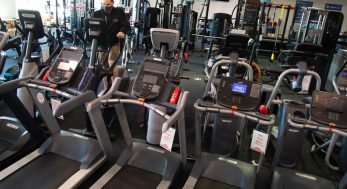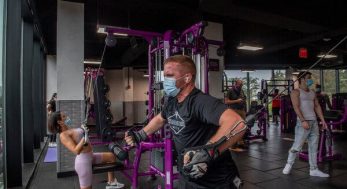What would you do if gyms ceased to exist?
Well, thanks to COVID-19, you don’t have to try too hard to imagine a reality without our sacred brick and mortar fitness playgrounds. For the last two-plus months, rowers have been gathering dust and wall balls have sat in a lifeless row after gym owners around the world were mandated to firmly close their gym doors. In fact, at the high water mark, 96% of CrossFit affiliates in the United States and 88% across the world were closed.
The closure of gyms sent waves of panic through the broader community of gym-goers who suddenly found themselves without a place of exercise.
I’ve observed two polar reactions to a lack of gym access, and both, in their own way, highlight how the fitness industry is failing the people it claims to serve.
Some simply stopped. Without the direction of a coach and the comfort of a barbell, they found themselves unable to exercise and act on healthy behaviors, choosing instead to throw in the (sweat) towel and give in to what I’ve heard termed the Quarantine 19 (pounds).
And then there are the fitness addicts, suddenly adrift and suffering a loss of identity without their daily WOD. These folks have been sent scurrying to the depths of the internet, chasing their dose in the form of thousands of air squats and push-ups. Whether motivated by fear of gaining weight or losing gains, the notion of not going to the gym for weeks on end has truly frightened these highly driven individuals.
One Huge Problem
The two opposite reactions described above highlight one huge problem: Gyms have made people dependent on their existence. They have failed to create autonomy in their clients. And this autonomy isn’t only about continuing to exercise. It’s about understanding the true intentions of exercise.
Exercise is something that we are built to do. Humans are designed to walk long distances, throw a punch or sprint in defense, and create intra-abdominal pressure as we sneeze or move our bowels. We are made to move and do so daily. So why do we need a facility to do this?
Gyms as we know them have been in existence for a very short time. They are a blip in the enormous span of human existence. The human race has managed without them for the majority of the 200,000 years we’ve walked this earth, and we have to be able to do so into the future. Gyms are slowly beginning to reopen, but this virus could raise its ugly head again and we must be prepared for a situation where in-person training isn’t possible for an extended period of time.
I write this not because I want to see gyms close for good. On the contrary, as the founder of the coaching education company, OPEX Fitness, I have a vested interest in the success of coaches and gym owners around the world. Currently, there are around 50 OPEX licensed gyms and approximately 3000 fitness coaches have graduated from our Coaching Certificate Program.
How to Find Fitness Autonomy
I am empathetic to the struggles the fitness industry is facing. But I do believe wholeheartedly that it is the responsibility of the coach to set each and every one of his or her clients up to be autonomous in fitness. If we can take that lesson on board then there will be positives that come from this.
Whether you’re having withdrawals and are itching for your next fitness fix or you’ve been suffering from a lack of motivation, finding autonomy in fitness will set you free.
The word autonomy comes from the Greek autos, self, and nomos, law. To have autonomy over your fitness is to have ownership of your training and be intrinsically motivated to exercise because it enhances your life. In short, it’s knowing what to do and doing it for the right reasons. The pandemic has demonstrated clearly that many are missing both the “what” and the “why” required for fitness autonomy.
On one hand, there is a lack of understanding in the general population of how to exercise without instruction and external motivation. Many people require the urging and directions of their coaches, peers, and doctors in order to show up at the gym and accept a recipe of burpees, front squats, and double unders.
My point is not to cast judgment on those with a lower fitness IQ, but instead, point out that gyms and coaches need to do a better job of educating their clients in two ways.
First, they need to communicate and encourage reflection on exercise. Instead of celebrating the blood, sweat, and tears, coaches should help their clients reflect on the learning experienced through physical expression.
Second, and most importantly, coaches need to help their clients connect the dots between exercise and a personal definition of living a larger life. Intrinsic motivation — exercising for oneself — is essential for fitness autonomy, but it takes more time, conversation, and introspection than most people are currently prepared to give to their fitness.
And on the other hand, the proper intention behind exercise has been lost. There are those who don’t need to be told to exercise, yet are still not autonomous in their fitness. They continue to work out as a coping mechanism, for social status (who am I if I can’t WOD?), to make up for a poor lifestyle and diet, and because they believe they should. Not because they can.
These people have been brainwashed to believe that exercise makes them worthy and morally good. They don’t need a coach to tell them to do a workout because they’ve got societal pressures to look and perform a certain way relentlessly echoing in their head 24/7. They exercise out of fear of not exercising. They may know how to exercise, but they are not free.
Finding the Balance
Both of the scenarios I’ve described above are unhealthy in different ways. Life needs fitness, but fitness isn’t life. The key is finding the balance that an individual can maintain independently of any external factors — be that access to a gym, an idea of themselves, or any other distorted motivations.
Autonomy won’t happen overnight, but it does start with the coach. The role of the fitness coach is to lead every client towards autonomy through a relationship that balances challenge and support.
Through years of experience and learning, coupled with reflection on how fitness enhances function, priorities, and purpose, everyone is capable of learning how to exercise with intent and become autonomous in fitness.
My ideal world isn’t one without gyms. It’s one where your fitness doesn’t rely on access to four walls and free weights. It’s one where you exercise because you can, not because you should.
Get The Newsletter
For a daily Digest of all things CrossFit. Community, Athletes, Tips, Recipes, Deals and more.



